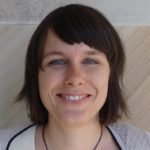La Bourse Egalité GSE, a été créée en 2015 par la Commission de l’Égalité-FGSE et le Décanat dans le cadre du Plan 50/50, dont le but est d’améliorer l’égalité des chances au sein de la faculté. D’une durée de trois ans (1 an, renouvelable une fois pour 2 ans), cette bourse ouvre un poste de rang de premier·ère assistant·e à des personnes (homme ou femme) qui ont connu une réduction ou une interruption des activités de recherche en raison de leur situation familiale et souhaitent relancer leur carrière.

lauréate de la Bourse Egalité GSE 2015-2018
La première lauréate est Mme Annegret Larsen. Elle a débuté son contrat postdoctoral le 1er septembre 2015 à l’Institut des dynamiques de la surface terrestre (IDYST).
Née en 1980, de nationalité allemande Mme Annegret Larsen conduit des recherches sur la géomorphologie et sur les adaptations humaines aux changements environnementaux. Elle a maintenant obtenu un poste de professeure assistante à l’Université de Wageningen (Pays-Bas) et maintient des contacts étroits avec plusieurs chercheurs de l’IDYST côtoyés durant son séjour à l’UNIL.
La Dre Annegret Larsen nous présente brièvement son parcours et son travail de recherche :
What were your motivations for doing a PhD?
I always wanted to find out something new, and I have been fascinated by landscapes, soil, rivers, and archaeology. Hence my PhD was on how humans changed surface processes in the Holocene, with a focus on Medieval Times.
What has the Bourse Egalité brought to you?
It gave me the possibility to get back into science after a break I had to take after my first son was born.
How far along are you in your career?
I am now 8 years out of my PhD, but took in total about 3 years of break for my children, hence I am offcially 5 years post-PhD.
What have been the difficulties related to your personal situation in regard to your career path?
I had to take more time than usual off when my first son was born due to health issues of the baby. Career grants from research foundations/national funds did not account for this longer-than-usual break, and this has limited my chances to continue in science. I have found this highly discriminating, and I will continue to raise this issue in the future if it persists.
What was the input of the FGSE in your career and its limits?
I have to thank FGSE that have given me the possibility to get back into science, which was priceless. When looking back, I found limiting that I wasn’t able to apply for SNF grants. Also, I am doing field-based research including environmental monitoring, and hence a three-year position was a little short. I would have probably needed another year to publish the results and make the most of the dataset I established. But in my view the overall outcome and experience is extremely positive.
Can you say a word on your future professional and private life goals?
I want to continue to do interesting and novel research, and continue on my path to better understand how the pre-human, natural environment was functioning. This links in with environmental restoration and conservation, e.g. into the topic of re-wilding. Privately, I want to enjoy the time with my two kids, and return paddle boarding on beautiful Lake Geneva, which I miss very much.
What are your projections for ten years from now?
At the moment I am working towards publishing the collected datasets, and based on this I will continue filling in the evident knowledge gaps. One goal is e.g. to establish a permanent monitoring side. I have just started a tenure track position at Wageningen University and Research in the Netherlands. For now, I would like to settle down, do interesting and novel research, and learn the secret of the successful teaching strategies over here. Wageningen University employs a very different approach to teaching, and from my first experience students seem to be highly motivated and competent.
A lire également
Auteur : CellComDec / Nicolas Bourquin
Laisser un commentaire